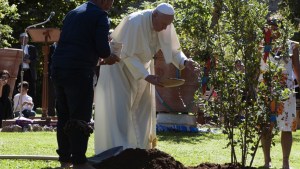Concern for the environment is an enormous opportunity for Catholic evangelization.
After all, Jesus Christ is the way, the truth, the life. Through him all things were made and everything that was made bears his stamp. To be grateful for the world as a precious gift is to take a step toward God, and to reject it is a step away.
1: The best modern Catholic thinkers saw the human person and the environment as interlinked.
In his landmark encyclical Rerum Novarum, Pope Leo XIII reminded a world changed by the industrial revolution that the dignity of workers is found in the nature of things, including the nature of the human person, and the call to cultivate the soil.
J.R.R. Tolkien gave us the highest artistic expression of this vision of man living in harmony with the world in the Shire of the Lord of the Rings. “The trees and the grasses and all things growing or living in the land belong each to themselves,” says Tom Bombadil’s wife, Goldberry, at the beginning of the story. In the end, the book is about those who see the intrinsic value of the earth saving it from those who see it only as something to exploit.
2: We learned the hard way that secular solutions alone can’t solve environmental problems.
It was surprising to learn this year that, after all the efforts of the past decades, the passion for environmental causes has only dropped. Gallup reports that 40% of adult Americans currently call themselves “environmentalists” — down from nearly twice that in 1991.
And today, both a third of environmentalists and two thirds of non-environmentalists prioritize economic growth over protecting the earth’s resources.
But it makes sense. According to Pope Francis, the great enemy of the environment is in our hearts.
“The great danger in today’s world, pervaded as it is by consumerism is the desolation and anguish born of a complacent yet covetous heart, the feverish pursuit of frivolous pleasures, and a blunted conscience,” he wrote.
Environmental degradation comes from hearts sick from greed and selfishness, and only God can fix those.
3: Without addressing the heart, secular solutions can be more destructive than the problems they hope to address.
Too often, environmentalists who start out rooting for the earth end up by wanting to root out human beings from the earth. On Earth Day 2021, groups reminded the world that “Central to the theme of the first earth day in 1970 was the understanding that U.S. population growth was a partner in the degradation of our nation’s environmental resources.”
But researchers such as Yale Environment 360’s Fred Pearce are seeing what the Church already knew. As Pearce put it, “Rising consumption today far outstrips the rising head count as a threat to the planet.”
As Pope Francis argues in Laudato Si’, “To blame population growth instead of extreme and selective consumerism on the part of some, is one way of refusing to face the issues. It is an attempt to legitimize … the right to consume in a way which can never be universalized, since the planet could not even contain the waste products of such consumption.”
4: The same attitude that tries to dominate human nature tries to dominate Mother Nature also.
Pope Francis also warned that our tendency to try to reshape humanity also leads to environmental degradation.
“Thinking that we enjoy absolute power over our bodies turns, often subtly, into thinking that we enjoy absolute power over creation,” he wrote, adding that even “valuing one’s own body in its femininity or masculinity is necessary.”
And he asked: “How can we genuinely teach the importance of concern for other vulnerable beings, however troublesome or inconvenient they may be, if we fail to protect a human embryo, even when its presence is uncomfortable and creates difficulties?”
5: What is needed is a lifestyle change.
Pope Benedict XVI made the point in his straight-forward way.
“Environmental degradation challenges us to examine our life-style and the prevailing models of consumption and production, which are often unsustainable from a social, environmental and even economic point of view,” he wrote and called for “new lifestyles, in which the quest for truth, beauty, goodness and communion with others for the sake of common growth are the factors which determine consumer choices, savings and investments.”
Pope Francis said the same thing more poetically. “If we approach nature and the environment without this openness to awe and wonder, our attitude will be that of masters, consumers, ruthless exploiters, unable to set limits on their immediate needs,” he said. “By contrast, if we feel intimately united with all that exists, then sobriety and care will well up spontaneously.”
Ultimately only awe and gratitude for truth, beauty and goodness, will change hearts and save the planet. Which is to say, nothing but Jesus Christ will do.



